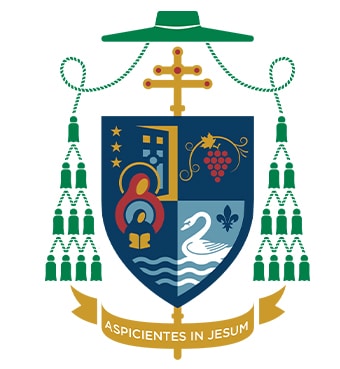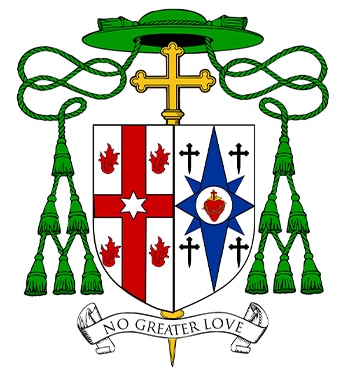Against a Growing Intolerance, Christians Must Witness Christ ‘for the World’
“Despotism may be able to do without faith, but freedom cannot,” said Alexis de Tocqueville. Today the U.S. faces a soft depostism seeking to marginalize religious expression from the public square.

This homily was delivered at the Basilica of the National Shrine of the Immaculate Conception in Washington at the Mass closing the U.S. bishops’ “Fortnight for Freedom,” which began June 21 and ends July 4. The Mass was broadcast live by EWTN.
We live in interesting times. In recent days, Pope Francis issued his first social encyclical, Laudato Si, dealing with ecological questions; and the U.S. Supreme Court handed down its decision on same-sex marriage. At any rate, both of these happenings give us Catholics both the opportunity and, to be sure, the duty to engage the world and witness to our teachings: to our vision of the life and dignity of the human person in a world which we recognize as both fallen and redeemed.
This “vision” enshrined in the Church’s moral teachings embraces what we could call both a natural and a human ecology, or what Pope Francis has called an “integral ecology.” An integral ecology demands that rain forests be protected because of what they do potentially and actually for the flourishing of the human species on this Earth. Likewise, an integral ecology tells us that marriage, understood for millennia as a union of one man and one woman, ought to be respected and protected.
In the Gospel reading today, Jesus taught his disciples that, while remaining in the world, they were not to be “of the world.” Yet, for Jesus and for his Catholic Church, not being of the world never means being against the world. Jesus who came into the world in order to save it calls us to be always for the world.
This being for the world explains why the Church is concerned with education, with health care; it explains our involvement in civic affairs and why we define politics as something honorable and as a legitimate, and even noble, vocation for the Christian.
For the World, Not Against It
Being for the world and not against the world is why we as a Church advocate for the poor and seek greater economic and social justice for all. As Catholics, we believe that the world in which we live in is our “highway to heaven,” the path on which we work out our salvation with the help of God’s grace. The Church is committed to the right and dignity of every human life, from the moment of conception until natural death; to the family built on marriage, understood as a permanent and exclusive union of one man and one woman; to the right ordering of society for the common good and in conformity to the natural law, because she feels that such commitments help promote human flourishing.
But these commitments do not divert her and her members from the pursuit of heaven. Rather, by addressing the obstacles, the roadblocks, the pot holes that may frustrate people’s pursuit of their transcendent vocations along that highway — the consequences of both personal and structural sin — the Church wishes to assist all those who travel it to reach heaven. In this way, our engagement in the world and for the world (and never against the world) does not contradict the Church’s spiritual mission, but complements it.
As Pope Benedict XVI said in Cuba three years ago:
“The Church lives to make others sharers in the one thing she possesses, which is none other than Christ, our hope of glory (Colossians 1:27). To carry out this duty, she must count on basic religious freedom, which consists in her being able to proclaim and to celebrate her faith also in public, bringing to others the message of love, reconciliation and peace, which Jesus brought to the world.” (homily, La Habana)
This religious freedom is, however, under stress throughout the world. The International Society for Human Rights, while acknowledging atrocities are committed against peoples and institutions of all the world’s religion, reports that 80% of all acts of religious discrimination in the world today are directed at Christians. Some 150,000 Christians are killed for the faith every year. As Pope Francis reminds us, the Age of Martyrs did not conclude with the peace of Constantine.
Even in our Western liberal democracies, discrimination against religion in general and Catholic Christianity in particular is growing — albeit in perhaps more sophisticated and less violent ways. Political analysts and human-rights advocates do include religion on their agenda. But most emphasize “tolerance,” as if religion were only a source of conflict. Or they speak about religion in terms of “individual choices,” as if religion were merely the concern of an individual’s conviction and were devoid of any social consequences. And so in our country, as in other Western countries, we see a tendency to relegate religion to the private sphere. And in these countries, we see the courts chipping away at the original understanding of religious freedom. In order to fit new political agendas, religious freedom is being reinterpreted narrowly to mean merely “freedom to worship,” but excluding the freedom to serve and the freedom to witness.
Education, family law, health care are just some of the areas in which narrow readings of religious freedom are paving the way for anti-religious policies. These efforts to restrict religious liberty are seemingly founded in a reductive secularism that has more in common with the French Revolution than with America’s founding. They seek to delegitimize the Church’s participation in public debate about issues that will determine the future of American society.
Yet, just as freedom of speech depends not only on one’s right to say what’s on one’s mind, but also on the existence of institutions like newspapers, universities, libraries, political parties and other associations that make up what we call “civil society,” so too freedom of religion must also encompass protecting those institutions that nourish the individual’s free exercise of religion.
In this country, at least up till now, thanks to the religious freedom guaranteed by the First Amendment, religious communities have been able to play an active role in society and to express their own vision of the human person and of the policies that rule society. The civil-rights movement of the 1960s was a religiously inspired movement; it was led by pastors, and those who marched gathered first in their churches.
Some today resent the public advocacy of religious people and communities. They accuse us of trying to impose our views on others. Yet, as St. John Paul II explained, the Church does not impose; she proposes. Dr. Martin Luther King Jr. and his movement for racial justice could not impose their views on the American people. They understood this — and, for this reason, they opted for nonviolence. But they made a proposition that touched the conscience of a nation.
Soft Depotism to Silence Religious Faith
Professing religious faith should not make a person a second-class citizen. While religion is personal, it is never private. The right to religious freedom has its foundation in the very dignity of the human person. Religious freedom is the human right that guarantees all other rights — peace and creative living together will only be possible if freedom of religion is fully respected. Alexis de Tocqueville, a Frenchman who wrote approvingly about our American experiment in democracy in the early 19th century, said: “Despotism may be able to do without faith,but freedom cannot.”
But even as de Tocqueville pointed out almost 200 years ago, despotism comes in both soft and hard forms. Thomas More, John Fisher, Peter and Paul and the first martyrs of the Church of Rome, whose feast days fell within our observance of this fortnight, were victims of despotism in its hardest form — as was John the Baptist, martyred for his witness about the truth of marriage. Today this type of hard despotism is decimating the Christian populations of the Middle East.
But in this country and in other liberal democracies, people of faith are being increasingly subjected to a soft despotism, in which ridicule, ostracism and denial of employment opportunities, of advancement are being used to marginalize us. We see this when butchers and bakers and candlestick makers are being put into the legal dock for refusing to renounce their religious beliefs.
A new religious intolerance has established itself in our country. Christian pastors are stalked and threatened for being “Christian” pastors; social scientists are expelled from universities for having turned up “politically incorrect” facts; charitable organizations and confessional schools are harassed if they take seriously their faith’s moral precepts and require their employees to support their missions. Yet, even in the face of such intolerance, we must give witness. To fail to do so would be to fail in the charity we owe our neighbor.
“Authentic witness,” Pope Francis reminds us, “is one that does not contradict, by behavior or lifestyle, what is preached with the word and taught to others” (Solemnity of Sts. Peter and Paul, 2015).
Today, some hold for a radical autonomy by which truth is determined not by the nature of things but by one’s own individual will. If I ask you, paraphrasing Abraham Lincoln, “If I were to call a tail a leg, how many legs would a cow have?” And were you to reply, “Five,” your answer would be wrong; but it would reveal to what extent the ascendant secularism of the culture is clouding your own thought processes. Your answer would be wrong because calling a “tail” a “leg” doesn’t make it one.
Yet such thinking has brought about the redefinition of marriage by our Supreme Court: As Chief Justice [John] Roberts said in his dissent, “The majority’s decision is an act of will, not legal judgment.” As Pope Francis has written so eloquently in Laudato Si, such thinking has also brought about the degradation of both our natural and our human or social ecologies.
On this Independence Day, we remember that the glory of our government is its protection of religious freedom. For much of our nation’s history, Catholics were regarded by many of their neighbors with suspicion, if not with hostility, because of the prevailing prejudice towards the Catholic faith in a predominantly Protestant America. Yet because of a healthy secularity promoted by our civil order and the Bill of Rights’ first freedom, the freedom of religion, Catholics were able to prosper in America: We built parishes, schools, hospitals, orphanages and other charitable institutions; we started businesses; we served honorably in our nation’s wars and held public office.
In other words, we availed ourselves of the opportunities made possible because of religious freedom and were able to fulfill our duty to engage the world and witness to our teachings, to our vision of the life and dignity of the human person — for as Christians, while we are not to be “of the world,” we are not “against the world”; because we are “in the world,” we are “for the world.”
God bless America — and may she always be the “land of the free and the home of the brave.”
via NCRegister.com








